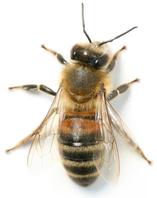

Bjorn Burke, Staff Reporter
"If the bee disappeared off the face of the earth, man would only have four years left to live." - Maurice Maeterlinck
In times gone by, local beekeepers were able to reasonably make assumptions about the quantity of honey their honeybees were expected to produce per hive during each honey flow. Alas, Jamaican beekeepers are at the mercy of the climate as well as human influence as they navigate through adverse conditions.
A honey flow, the term used by beekeepers to describe the period in which there are favourable weather conditions resulting in at least one healthy source of nectar for the honeybees to feed on, is compromised during a prolonged dry period across the island. Without ample rainfall, the availability of nectar and pollen producing plants for honey bees to feed on will decrease. As such, without the raw materials necessary to actively do their life's work, the honeybees' ability to produce honey has been hampered.
Generating more
It is important to take note of the flowering of plants, especially the flow of nectar. Honeybees work at their best when there is an abundance of nectar and pollen, resulting in them generating more bee larvae, or brood, so as to increase the population of the colony.
Some local beekeepers have reported that they have had bees just up and leave their hives. They suspect that any signs of a long drought and lack of 'food' for the bees is to blame.
It is at this point beekeepers search for a beacon of hope as things look grim for those dependent on the honeybees for their livelihood. Several apiculturist (beekeepers) have been greatly affected during drought periods and have no choice but to prepare for the worst.
Many simply have not been finding the amount of honey they desire that would make it a worthwhile sale. During a routine inspection at the apiary, many hopeful apiculturists will bemoan the unfortunate fact that they have discovered that their bees in particular hives have completely absconded.
As it turns out, it is not only the beekeeper who feels the pinch. The trickle-down effect makes it an issue for which the farmers, too, should be concerned. The bees (and other pollinators of course) are of great irrefutable worth as many plants are dependent on bees for reproduction. Had the bees not existed, many of the world's flowering plant species, including the agricultural kind, quite simply could not be produced. This translates to roughly one-third of what we human beings eat. We rely heavily on their apparently unappreciated efforts in furtherance of sustaining our food system. That's something to talk about.
Human influence
Additionally, the farmer who opts to use insecticides has inadvertently done himself a disservice. Unfortunately, the bees are harmed by the toxic chemicals used as the farmers seek to use these methods in crop maintenance.
If there is a significant decrease in numbers in honeybees due to a drought or human influence, we all stand to be affected. Belgian poet Maeterlinck aptly surmised the repercussions of diminishing honeybees in the aforesaid quote. Honeybees also play an integral role in pollinating crops inclusive of; scotch bonnet peppers, cabbage, okra, watermelon and several others we consume on a daily basis. Without them there would be dire consequences if we are not able to produce one of man's basic physiological needs: Food.
Questions, comments, observations? You can email me at bjorn.burke@gleanerjm.com.
